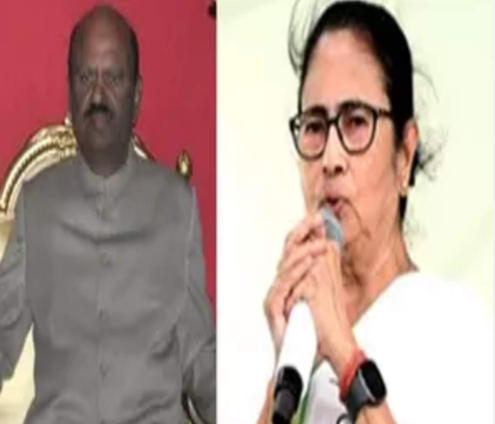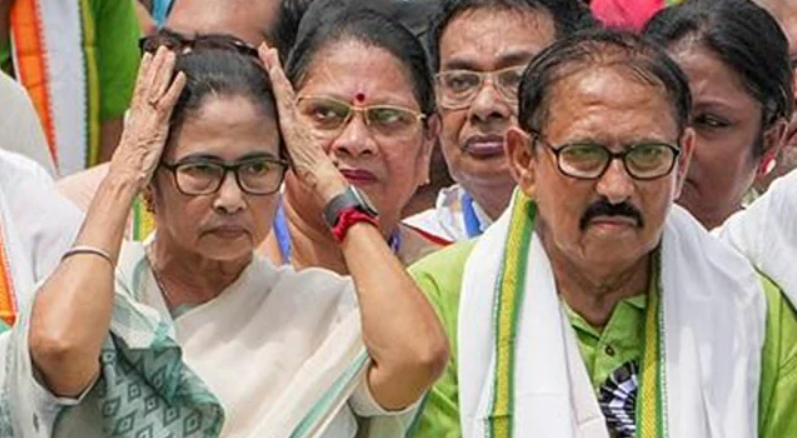West Bengal Raj Bhawan Fines Two Newly Elected TMC MLAs Over ‘Illegal’ Swearing-In:-
In a recent development that has sparked political controversy and legal debate, the West Bengal Raj Bhawan has fined two newly elected Trinamool Congress (TMC) MLAs for what has been deemed an ‘illegal’ swearing-in ceremony. This incident underscores the ongoing tensions between the state government and the governor’s office, highlighting the complexities of constitutional procedures and the political landscape in West Bengal. This article delves into the details of the incident, the legal arguments, the political reactions, and the broader implications for the state’s governance.
Background of the Incident
The controversy began when two newly elected MLAs from the TMC, Sujit Bose and Tapas Roy, took their oath of office in a ceremony that was not conducted by the state’s Governor, C.V. Ananda Bose, as is traditionally required. Instead, the swearing-in was conducted by a senior official from the state assembly, a move that the Governor’s office has termed as ‘illegal.’
According to the Constitution of India, newly elected legislators are required to take their oath of office before the Governor or a person appointed by the Governor for this purpose. Deviating from this norm, the TMC leadership arranged for the MLAs to be sworn in by a state assembly official, arguing that it was a necessary step given the ongoing friction between the Raj Bhawan and the state government.  for more information click on this link
for more information click on this link
Legal Arguments and Constitutional Provisions
The Governor’s Stance
The Governor’s office has asserted that the swearing-in ceremony conducted by a state assembly official was unconstitutional. Article 188 of the Indian Constitution specifies that every member of a state legislature must take an oath before the Governor or a person appointed by him. The Governor, therefore, contends that any deviation from this protocol is a violation of constitutional provisions.
The Raj Bhawan has also emphasized that the authority to administer the oath cannot be delegated to anyone without the Governor’s explicit consent. By bypassing the Governor, the TMC MLAs have not only breached constitutional norms but also undermined the sanctity of the oath-taking process.
The TMC’s Defense
The TMC, on the other hand, argues that the swearing-in was necessitated by extraordinary circumstances. The party has cited previous instances where similar actions were taken due to administrative or political exigencies. Furthermore, the TMC contends that the Governor’s refusal to facilitate a timely swearing-in ceremony was politically motivated, aimed at creating hurdles for the newly elected MLAs to assume their duties.
TMC leaders have pointed out that the Constitution allows for flexibility in extraordinary situations and that the state assembly official who conducted the ceremony acted in good faith to ensure that the democratic process was not stalled. They have also accused the Governor of overstepping his constitutional role and engaging in partisan politics.
The Fine and Its Implications
In response to the incident, the Raj Bhawan has imposed a fine on the two MLAs, Sujit Bose and Tapas Roy. The fine is seen as a punitive measure intended to uphold the rule of law and reinforce the importance of adhering to constitutional procedures. However, the exact amount of the fine and the legal basis for its imposition remain subjects of contention.
Legal Precedents
Legal experts have weighed in on the matter, with opinions divided on the constitutionality of the Raj Bhawan’s actions. Some argue that the imposition of a fine is unprecedented and lacks a clear legal basis, as the Constitution does not explicitly provide for such punitive measures by the Governor’s office. Others suggest that the fine could be seen as an administrative action aimed at maintaining constitutional decorum.  for more information click on this link
for more information click on this link
Political Reactions
The political reactions to the fine have been predictably polarized. The TMC has condemned the Governor’s actions, calling them an overreach of authority and an attempt to undermine the state’s elected representatives. TMC leaders have vowed to challenge the fine in court, arguing that it sets a dangerous precedent and infringes upon the autonomy of West Bengal Raj Bhawan the state legislature.
The opposition parties, particularly the Bharatiya Janata Party (BJP), have supported the Governor’s decision, framing it as a necessary step to ensure adherence to constitutional norms. They have accused the TMC of flouting legal procedures for political convenience and called for stricter oversight of the state’s governance.
Broader Implications for Governance
State-Center Relations
The incident highlights the ongoing tensions between the state government and the central authority represented by the Governor. The relationship between the Governor and the state government in West Bengal has been particularly fraught, with frequent clashes over administrative and political issues. This latest controversy adds to the narrative of an escalating power struggle, which has broader implications for state-center relations in India.
Constitutional Interpretations
The incident also raises important questions about the interpretation and application of constitutional provisions. The role of the Governor, the limits of his authority, and the flexibility allowed in extraordinary West Bengal Raj Bhawan circumstances are all subjects of ongoing legal and academic debate. This case could potentially set a precedent for future instances where constitutional norms are perceived to be at odds with political realities.
Political Stability
For West Bengal, the controversy could impact political stability and governance. The ongoing friction between the Governor and the state government could lead to administrative delays and hinder the implementation of policies. It West Bengal Raj Bhawan also risks further polarizing the political climate, making collaborative governance more challenging.
Conclusion
The fine imposed by the West Bengal Raj Bhawan on two newly elected TMC MLAs for their ‘illegal’ swearing-in has brought to the forefront the delicate balance between constitutional procedures and political pragmatism. The incident underscores the complexities inherent in India’s federal structure, where state and central authorities must navigate a shared but often contentious landscape of power and responsibility.
As the TMC prepares to challenge the fine in court, the legal and political ramifications of this incident will continue to unfold. The case will likely serve as a critical reference point for discussions on the role of Governors, the autonomy of state legislatures, and the interpretation of constitutional norms in India’s dynamic democratic setup. Whether the incident will lead to a more cooperative approach or further entrench the divisions remains to be seen. ALSO READ:- Mahua, Others Move Supreme Court Against Nameplate Orders by State Governments 2024




